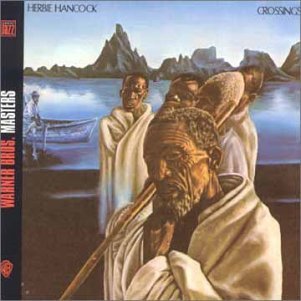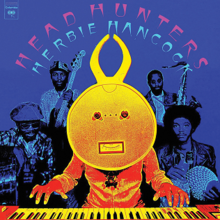
Herbert Jeffrey Hancock is an American jazz musician, bandleader, and composer. Hancock started his career with trumpeter Donald Byrd's group. He shortly thereafter joined the Miles Davis Quintet, where he helped to redefine the role of a jazz rhythm section and was one of the primary architects of the post-bop sound. In the 1970s, Hancock experimented with jazz fusion, funk, and electro styles, using a wide array of synthesizers and electronics. It was during this period that he released perhaps his best-known and most influential album, Head Hunters.

Bennie Maupin is an American jazz multireedist who performs on various saxophones, flute, and bass clarinet.

The Headhunters are an American jazz fusion band formed by Herbie Hancock in 1973. The group fused jazz, funk, and rock music.

Secrets is a jazz-funk fusion album by keyboard player Herbie Hancock. It is also Hancock's seventeenth album overall. Participating musicians include saxophonist Bennie Maupin and guitarist Wah Wah Watson.
Paul Jerome Jackson Jr. was an American jazz electric bassist and composer. He was a founding member of the Headhunters and played on several of Herbie Hancock's albums, including Head Hunters and Thrust. Jackson subsequently moved to Japan and started a voluntary concert called Jazz for Kids, with the intent of familiarizing students there with African-American history.

Sextant is the eleventh studio album by Herbie Hancock, released in 1973 by Columbia. It is the last album with the Mwandishi-era sextet featuring saxophonist Bennie Maupin, trumpeter Eddie Henderson, trombonist Julian Priester, bassist Buster Williams and drummer Billy Hart. Synthesizer player Patrick Gleeson and percussionist Buck Clarke also appear.

Mwandishi is the ninth album by jazz pianist Herbie Hancock, released in 1971. It is the first album to officially feature Hancock’s ‘Mwandishi’ sextet consisting of saxophonist Bennie Maupin, trumpeter Eddie Henderson, trombonist Julian Priester, bassist Buster Williams and drummer Billy Hart.

Thrust is the fourteenth studio album by American jazz-funk musician Herbie Hancock, released in September 1974 on Columbia Records. The album reached No. 2 on the Billboard Top Soul Albums chart and No. 13 on the Billboard 200 chart. It is the second album featuring The Headhunters: saxophonist Bennie Maupin, bass guitarist Paul Jackson, drummer Mike Clark and percussionist Bill Summers.

"Watermelon Man" is a jazz standard written by Herbie Hancock for his debut album, Takin' Off (1962).

Future Shock is the thirty-fifth album by American jazz pianist Herbie Hancock, released in August 1983 by Columbia Records. It was his first release from his electro-funk era and an early example of instrumental hip hop. Participating musicians include bass guitarist Bill Laswell, guitarist Pete Cosey and drummer Sly Dunbar.

Mr. Hands is the twenty-fourth album by Herbie Hancock. Unlike the preceding album, Monster, which was conceptualized as a dance album, Mr. Hands is a collection of different musical styles with distinct groups. It features bass guitarist Jaco Pastorius on the track "4 A.M.," plus multiple guests including Bennie Maupin, Sheila E. and Ron Carter, plus an all-synthesizer track ("Textures") performed entirely by Hancock. "Shiftless Shuffle" was recorded by the members of the Headhunters quintet in 1973 during the sessions for the album Head Hunters. This album was the first on which Hancock used a computer, this time an Apple II. He would continue his relationship with Apple Computer for many years.

Man-Child is the fifteenth studio album by jazz pianist Herbie Hancock. The record was released on August 22, 1975 by Columbia Records. It was the final studio album to feature The Headhunters, and a number of guest musicians including saxophonist Wayne Shorter, a full brass section, three different guitarists, and Stevie Wonder on harmonica.

Takin' Off is the debut album by jazz pianist Herbie Hancock released in 1962 by Blue Note Records. The album features veteran tenor saxophonist Dexter Gordon, trumpeter Freddie Hubbard, bassist Butch Warren and drummer Billy Higgins. The album is a creative example of music in the hard bop idiom. The bluesy track "Watermelon Man" made it to the Top 100 of the singles charts, and went on to become a jazz standard. Hancock released a funk arrangement of “Watermelon Man” on his 1973 album Head Hunters. Takin' Off was initially released on CD in 1996 and then again in remastered form in 2007 by Rudy Van Gelder.
"Chameleon" is a jazz fusion standard composed by Herbie Hancock with Bennie Maupin, Paul Jackson and Harvey Mason, all of whom also performed the original 15:44 full-length version on the 1973 album Head Hunters, and featuring solos by Hancock and Maupin. The 9:41 edit omits an out-of-tune segment, features a new bassline added in at around 6:40 and new instruments added in post-production.

Bill Summers is an American, New Orleans based Afro-Cuban jazz/Latin jazz percussionist, a multi-instrumentalist who plays primarily on conga drums.

Crossings is the tenth album by jazz pianist Herbie Hancock, released in 1972. It is the second album in his Mwandishi period, which saw him experimenting in electronics and funk with a sextet featuring saxophonist Bennie Maupin, trumpeter Eddie Henderson, trombonist Julian Priester, bassist Buster Williams and drummer Billy Hart. The album is the band's first to feature synthesizer player Patrick Gleeson. He was scheduled to "set up his Moog for Hancock to play." However, Hancock was so impressed with Gleeson that he "asked Gleeson not only to do the overdubs on the album but join the group."

V.S.O.P. is a 1977 double live album by keyboardist Herbie Hancock, featuring acoustic jazz performances by the V.S.O.P. Quintet, jazz fusion/ jazz-funk performances by the ‘Mwandishi’ band and The Headhunters.

Flood is the second live album, and sixteenth album overall, by American jazz pianist and keyboardist Herbie Hancock. Recorded live in Tokyo, the album was originally released exclusively in Japan in 1975 as a double LP 洪水, reads kōzui meaning flood. It features The Headhunters performing selections from the albums Maiden Voyage, Head Hunters, Thrust, and Man-Child –– with the latter album still two months away from release at the time of these concerts.

The discography of the American jazz artist Herbie Hancock consists of forty-one studio albums, twelve live albums, sixty-two compilation albums, five soundtrack albums, thirty-eight physical singles, nine promo singles and four songs not released as singles, but that charted due to downloads. This article does not include re-issues, unless they are counted separately from the original works in the charts, furthermore because of the enormous amount of material published, this discography omits less notable appearances in compilations and live albums. The discography shows the peak weekly main chart positions of eight selected countries: United States, France,[a] Germany, Japan,[b] Netherlands, Sweden,[c] Switzerland and United Kingdom. Positions also listed on United States are R&B / hip hop, dance / club, jazz[d] and bubbling under charts.[e] The peaks do not refer necessarily to the position that a record reached when it was first released. Also included are certifications from the Recording Industry Association of America (RIAA)[f] and the Bundesverband Musikindustrie (BVMI).[g]

The Jewel in the Lotus is the debut album by jazz woodwind player Bennie Maupin, recorded in March 1974 and released on ECM later that year. The sextet's rhythm section consists of pianist Herbie Hancock, bassist Buster Williams and percussionists Billy Hart, Freddie Waits and Bill Summers, with guest appearances from trumpeter Charles Sullivan. The title is a translation of the Buddhist mantra Oṃ maṇi padme hūṃ.


















